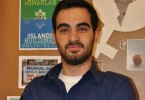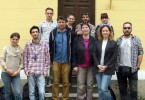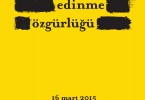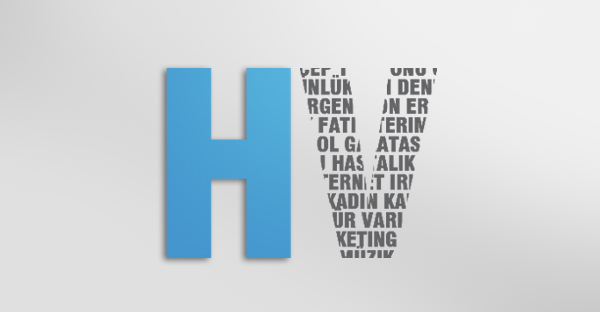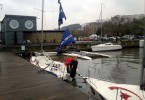Manon Loisel
At first glance, it’s easy to see that Richard Reid is passionate by the energy and promise that dealing with children gives him. Before I could ask any questions, he said “Can I ask you a few questions lady? What are you studying? Why do you want to be journalist? … Ah, that’s interesting!”.
No need to ask him the reason why he chose to work for UNICEF for 26 years, it’s obvious that children and youth in general are a central concern for him.
The curiculum vitae of Richard Reid is impressive. This teacher of International Relations and Humanities at Bilgi University worked for the United Nations Children’s Fund (UNICEF) for 26 whole years. He has been Country Director in Nigeria, Turkey, Regional Director of the Middle East and North Africa and also of former socialists countries. He has worked for cease fires to protect children in war zones like Lebanon, Sudan, Bosnia, Chechnya, or Iraq, and was named “UN Hero” at the 50th anniversary of the UN, in 1995.
This kind of life can not be summarised in one article, but let’s try to know more about his exceptional career.
“How did you get into development work?
-I studied in journalism school in California. But I stopped quickly because I couldn’t be a fast writer. I was writing for local newspapers but I was not able to work on tight deadlines. Then I postponed a scholarship and went to Pavia in Italy for one year. I fell in love with Italy. I already knew that I wouldn’t stay in the US.
After teaching journalism for two years, I became the director of the Robert College – now Bogazici University – in Istanbul. The boys’ school, which was a good one : Orhan Pamuk and also Tosun Terzioglu, the former rector of Sabanci University were there as students. I also met my wife – Fatma Torun Reid, a Turkish psychotherapist. Directly I thought , “there goes my heart…”
“At Robert College I taught the kids to get involved in civil missions. We had a Landrover and some money. We decided to build schools every summer in diferent parts of Turkey, for example in Amasya.
I really liked this development work. After this, I worked for the NGO “Save the children”. My name came up in the UNICEF simply because I did some work in Uganda that caught their attention.
-How was your experience of the UN?
“My experience of the UN was wonderful. I lived in 11 different countries, mostly in Africa or in the Middle East, I got to see about 40 heads of state.”
“I must say that the work in the UN is not easily reconcilable with family life. My kids grew up in Africa, they have a crosscultural education but it was hard for them to move all the time.”
“I met many interesting people. In Sudan, we stopped the civil war, that’s where I got to know Bernard Kouschner (the French minister of foreign affairs). At that time, he was directing his NGO “Medecins sans frontières”. This man has something really authentic and I loved to talk with him.”
“The African countries were my favourite missions. The effect that the UN does was immediately visible. I remember a project in Nigeria. We brought water to 27 million people.”
“People were extremely cooperative. The difficulty, most of the time, was to convince the rulers. I had critical moments. For example, I was put on house arrest by El Béchir, the president of Sudan. I woke up in my hotel and two soldiers were waiting in front of my door. They prevented me to go out till they brought me to the Sudanese president who just asked me “What are you doing here?”, I spent hours convincing him to let the UNICEF do its role in Sudan. “
I asked him: “How many children do you have Mister President?”, he answered six and I said “No, you have 7 million children, all the Sudanese children are under your responsibility.”
“The craziest mission I did? For sure it was to lead the first international team in Iraq during the first Gulf War in 1991. I can remember it precisely : they stopped the bombing for six hours for us to provide hundreds of emergency drugs, nutritional assistance, etc. We had 12 big trucks. There was no electricity. We could have been killed. This mission was the only time when people from the UN tried to stop me from doing. Everybody tried to persuade me that it was too dangerous. I had problems with John Bolton, the Bush administration’s ambassador at the UN. He told me: “Anything you bring to Iraq, Sadam Hussein will use”.
-What do you think about the UN current actions?
“Generally speaking, the UN is like a football team with 192 owners. The owners are all different and they all have different ideas of how to win. Next to the six principal organs of the UN, there are 36 organizations which have specific areas of competences, such as UNESCO, World Health Organization, Food and Agriculture Organization, International Monetary Fund, the World Bank, ASEAN, G77, … They carry out specific work related to their field of competence, always related to the country they’re in. Some are really good and really efficient.”
“The big problem linked to the UN is the Security council functioning. The Security Council is a very powerful instrument but it is abnormal that there are still five permanent members. It’s an absurdity. The Security Council is a political power center, but it is handicapped by the selfishness of these five members. They are the bigest sellers and makers of arms.”
“But focusing on current event, I think that the Copenhagen Summit will only be a jumble of brave words. Governments will lie.”
“Anyway, global warming is a key issue. What kind of world do we want to leave to our children? For me, things are going better concerning global warming awareness. We have had good signs from Brazil, South Korea and China. At first, developing countries have said “You don’t want us to develop”, but now promises of lowering emissions and promises to develop wind and solar energy have been made.”
“I truly believe that a global cooperation will come slowly from the civil society. An environmental solidarity is possible. And once again it depends on the youth to react.”



